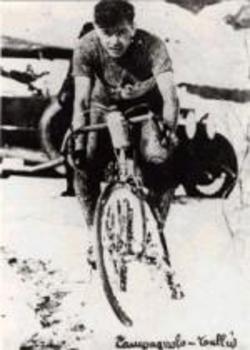The Classic Era
Mood:
 chillin'
Topic: Cycling
chillin'
Topic: Cycling

Some maintain that the “Classic Era” of racing bicycles ended in 1983, the year the great Tullio Campagnolo passed away. Tullio began his amateur racing career in 1922. In 1930, he patented his innovative quick-release skewer that would become the standard for the bicycle industry -- a design that is still in use 80 years later. Tullio’s numerous inventions helped define what I consider the “classic racing bicycle”: a hand-brazed, lightweight steel, lugged frame outfitted with precision-machined aluminum allow components. When I got my first “good bike” back in the early 1970s this was the standard, and it was still the standard when I built-up my Ciocc in the 1980s. Even after Tullio’s passing, both the professional peleton and my cycling buddies in the Shreveport Bicycle Club continued to ride lightweight steel frames with aluminum components. I’d go so far to argue that the “Classic Era” didn’t end abruptly with Tullio’s passing, but gradually faded as steel and aluminum gave way to carbon fiber in the 1990s.
I used to think that my own “Classic Era” of cycling ended after I moved from Shreveport to Baton Rouge in 1990 and stopped riding. There wasn’t an abrupt cessation – I tried to fit in with the local cycling culture, but found it seemingly polarized between some USCF racers who sprinted on their fixed-gear bikes at the local velodrome and slower-riding tourists who drove an hour out-of-town just to get to the start of a club ride. Not owning a fixed-gear bike or having time for the touring club’s nearly all-day outings, I didn’t mesh well with either group. I was an out-of-place “roadie” among “trackies” and tourists. After a lonely, wet, miserable ride one Spring I parked my Ciocc – and didn’t ride again. I gave away my extensive collection of Bicycling magazines and consigned my cycling paraphernalia to the attic. A sport that I’d passionately enjoyed for 20 years was relegated to the realm of “I used to do that.”
Then, one day last May, I wheeled my Ciocc out of our boat port. I needed to shed some weight and decided to start riding my Ciocc on the rollers again to burn-off some extra calories. Poor Ciocc was covered with 17 years of accumulated dust and road grime left-over from her last wet ride. Her tires were flat and her cyclocomputer was long dead, but her wheels were still as true as the day I parked her. I cleaned her up, mounted new sew-ups, pulled on my (rather snug-fitting) cycling shorts and hesitantly climbed on my rollers. I wobbled at first then started spinning. It was as if I’d suddenly emerged from a “time-warp” in which I’d never lost interest in cycling. After a short ride, I eagerly dashed out and bought the latest issue of Bicycling – and discovered that my “time-warp” had deposited me in an era where racing bicycles had 20-something gears, weighed 17 pounds and looked like props out of a science-fiction movie. I wonder what Tullio would think if he saw one of these futuristic carbon fiber fabrications? Then again, maybe he would have invented them if he’d stuck around.
Issues of Bicycling magazines are once again accumulating on the back of the toilet. I’m furiously riding my wind trainer two-to-three times a week after work. On weekends I go for leisurely rides on my Ciocc with my new cycling buddy – my six year-old daughter April. She can easily manage10 miles per hour on her “Free Agent” BMX racing bike as we tour the relatively car-free roads of the quiet subdivisions around us. I recall this is how I started riding – and fell in love with cycling many years ago.
I guess you could say my “Classic Era” didn’t end after all – it just got interrupted. I don’t expect it will end anytime soon, either. My Ciocc still has a lot of miles left on her, and I have a lot of miles left in me.


 The good news: I've got my Cateye cyclocomputer working and mounted on my Ciocc so I can ride her on my wind-trainer in the evenings after work. It is amazing what 30 minutes on the bike can accomplish! My Cateye has a cadence sensor and a rear wheel sensor, so I'll be able to track my speed and distance ridden - I couldn't do that on the trainer with my front-wheel sensored Bell computer. I plan to increase the length/intensity of my training and get really fit (as opposed to flabby) over the holidays. My goal is to be ready for the road again next Spring!
The good news: I've got my Cateye cyclocomputer working and mounted on my Ciocc so I can ride her on my wind-trainer in the evenings after work. It is amazing what 30 minutes on the bike can accomplish! My Cateye has a cadence sensor and a rear wheel sensor, so I'll be able to track my speed and distance ridden - I couldn't do that on the trainer with my front-wheel sensored Bell computer. I plan to increase the length/intensity of my training and get really fit (as opposed to flabby) over the holidays. My goal is to be ready for the road again next Spring!